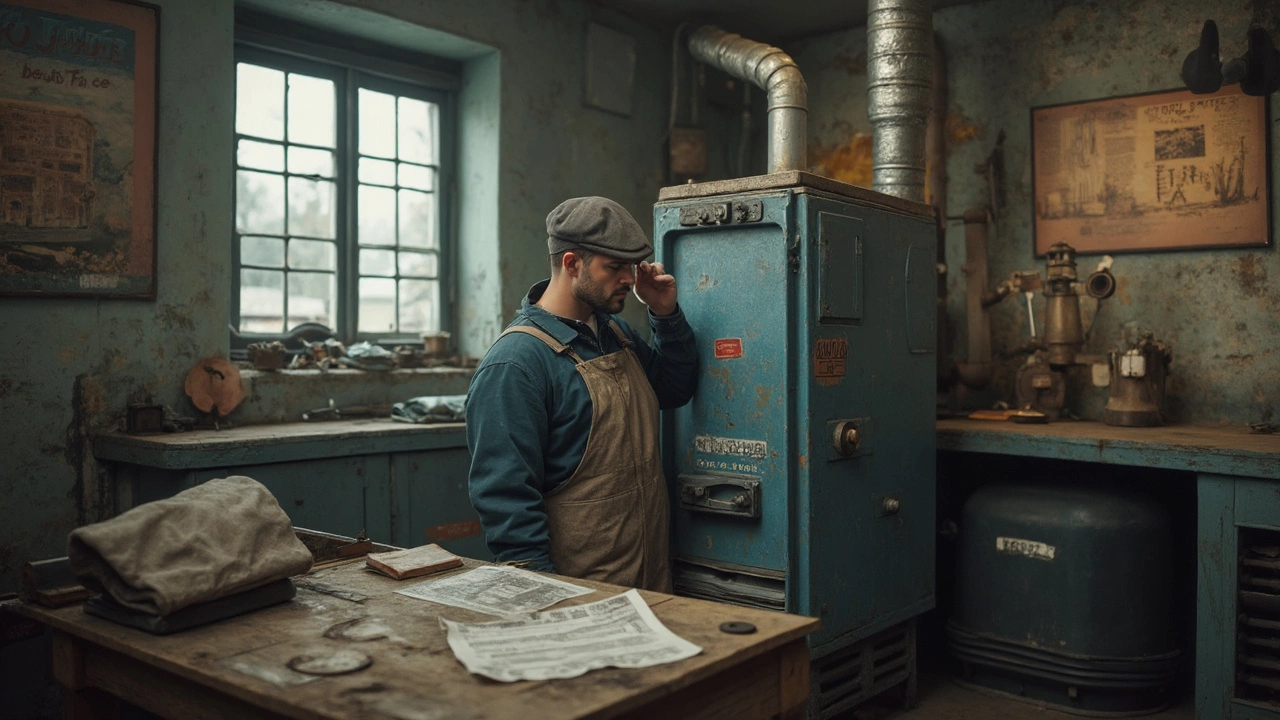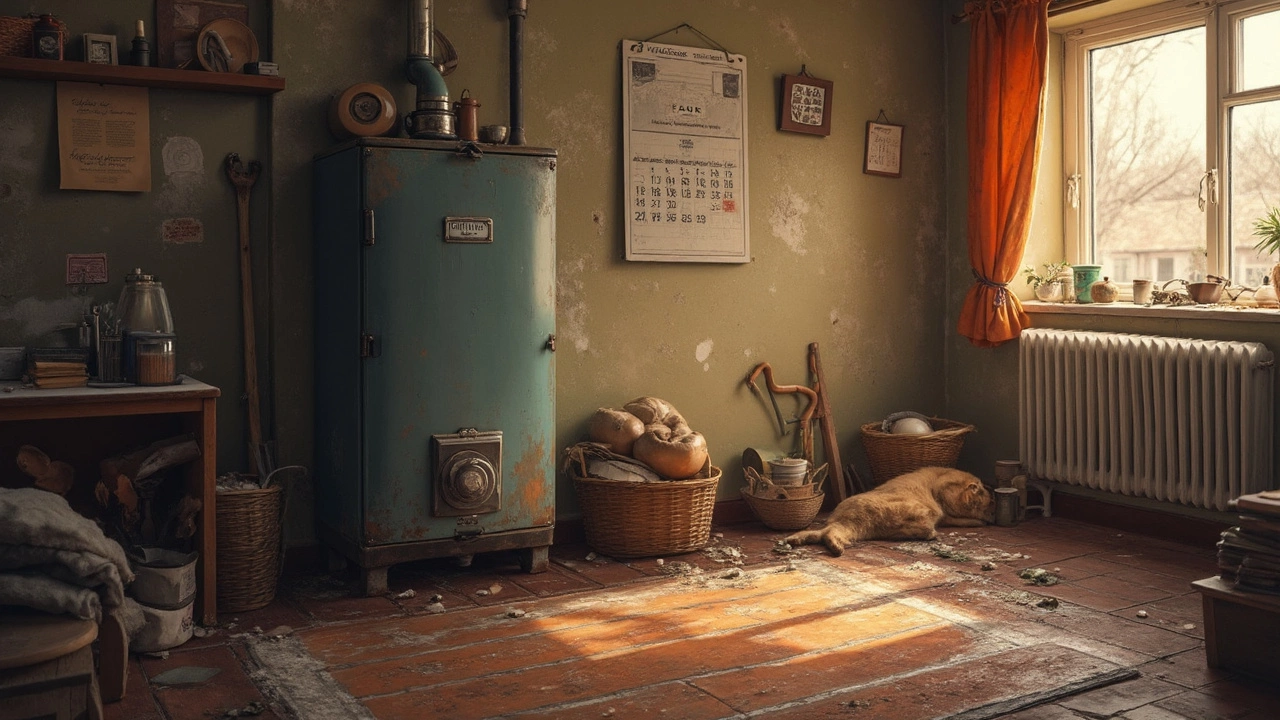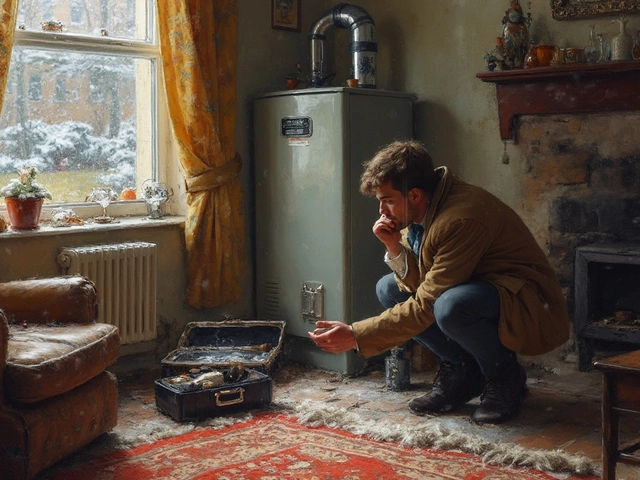Ah, boilers—the unsung heroes of our homes, quietly keeping things warm and cozy. But, like all good things, they don't last forever. Most boilers are designed to soldier on for 15 to 20 years. Yet, their actual lifespan can vary based on a few crucial factors.
Why the big range? Well, much like cars or appliances, it depends on how well you take care of them. Regular maintenance is one big piece of the puzzle. Things like annual check-ups can catch issues early, helping your boiler live a long, fulfilling life. And don't forget, a quality installation can also set the stage for a longer lifespan.
Ignoring your boiler until something goes wrong? Not the best plan. Being proactive can save you money and headaches down the line. Trust me, no one wants to find out their boiler's kaput on the coldest day of the year.
- Understanding Boiler Lifespan
- Factors Affecting Longevity
- Maintenance Tips for a Long-lasting Boiler
- Signs Your Boiler Needs Attention
- When to Consider Replacement
- Choosing the Right Boiler for Your Needs
Understanding Boiler Lifespan
So, how long can you really expect your boiler to stick around? On average, the lifespan of most residential boilers is about 15 to 20 years. But this isn't set in stone. Various factors can stretch or shrink this timeline.
The Role of Maintenance
Consistent boiler maintenance is crucial. Simple things like getting an annual service can catch little problems before they become big, expensive ones. A well-maintained heating system is not just more efficient; it lasts longer too.
Quality Matters
Boiler quality can also play a big role in lifespan. Premium brands often offer higher-quality components that may stand the test of time better than cheaper alternatives. It's like choosing between a robust truck or a compact sedan for off-road adventures—one's going to handle the bumps a bit better.
Environmental Impact
Surrounding conditions have their say, too. Hard water areas can gunk up important parts, reducing efficiency and longevity. Regularly flushing your system or using a water softener can help counteract this.
| Boiler Type | Average Lifespan | Maintenance Frequency |
|---|---|---|
| Gas Boiler | 15 years | Annual |
| Electric Boiler | 15–20 years | Annual |
| Oil Boiler | 15–20 years | Annual |
Remember, just like us, boilers love attention. Treat them well, and they'll stick around longer than you might expect.
Factors Affecting Longevity
Have you ever wondered what makes some boilers last longer than others? Well, it's not magic. Let's break down a few key factors that play a role in how long your trusty boiler sticks around.
Quality of Installation
You know how they say a good foundation is key? It's the same with boilers. A well-done installation is crucial. If the initial setup is done right, your boiler will likely have fewer problems down the line. So, hiring a qualified installer can make all the difference.
Regular Maintenance
Think of your boiler as a car—it needs regular tune-ups to keep running smoothly. Routine maintenance helps catch any small issues before they become big ones. An annual check by a professional can include cleaning, examining parts, and testing the overall system to ensure efficiency.
Quality of the Boiler
Not all boilers are created equal. Higher quality models tend to last longer. It’s a bit like choosing between a high-end gadget and a generic one. Investing in a better quality boiler may cost more upfront but could save you money in the long haul.
Water Quality
Believe it or not, the quality of your water can impact your boiler's health. Hard water, which contains more minerals, can lead to scale build-up inside the boiler. Over time, this can affect efficiency and lead to damage.
| Factor | Impact on Boiler Lifespan |
|---|---|
| Installation Quality | High impact if done poorly |
| Maintenance | Significant impact with regular care |
| Boiler Quality | Stronger models tend to last longer |
| Water Quality | Can lower lifespan if water is hard |
Usage Patterns
Are you cranking up the heat all the time? Intense or constant use can wear down a boiler faster. Keeping an eye on your usage and avoiding extreme settings can help extend its life.
All these factors combined dictate how long your boiler can keep doing its job. Pay attention to these areas, and you might just add a few more years to its lifespan.
Maintenance Tips for a Long-lasting Boiler
Want your boiler to stick around for as long as possible? It's all about giving it the TLC it deserves. Regular maintenance is not just a good idea—it's essential for extending the life of your heating system.
Schedule Yearly Check-Ups
First things first, make it a habit to get your boiler serviced annually. A pro will come in, inspect the boiler, and catch any small issues before they become big, expensive headaches. This kind of preventive care is a lot easier—and cheaper—than dealing with a sudden breakdown.
Keep an Eye on Pressure
Boilers are like Goldilocks when it comes to pressure: they need it just right. Too much can be dangerous, too low, and they won't work efficiently. Every month, take a look at the pressure gauge. If it's out of the normal range, check the manual or call in a technician.
Flush the System
Over time, gunk and sludge can build up inside your radiator and pipes, making your heating system work overtime. Flushing the system every few years keeps things running smoothly. This is something a professional should handle, but it's worth every penny for the boost in efficiency.
Listen for Strange Noises
Boilers should pretty much purr, not rumble or bang. If yours is making odd sounds, it could be a sign of trapped air or limescale buildup. Don't ignore these sounds—get them checked out to keep everything in tip-top shape.
Keep Vents Clear
Blocking a boiler vent is like forcing your car to run uphill in neutral—not good. Make sure the area around your boiler is free of clutter and that all vents are unobstructed. This ensures proper ventilation, preventing overheating or dangerous fume buildup.
Check for Leaks
If you're finding water around your boiler, that's a red flag. Leaks can cause pressure drops and water damage, leading to a heap of trouble. Spot any dampness? Call a technician pronto.
A Quick Note on Thermostats
A thermostat that can barely tell hot from cold is not ideal. Make sure yours is calibrated correctly and positioned well. A thermostat in good working order helps your boiler function efficiently, saving you on energy bills.
Following these tips could mean you get the full 20 years or more out of your boiler, which is a big win for your wallet and comfort.

Signs Your Boiler Needs Attention
So, you've been hearing strange noises coming from your boiler room, or maybe your home isn't as toasty as it used to be? These could be hints that your boiler is crying out for some love.
Spotting the Symptoms
First off, if your boiler starts making weird noises—think clunking, banging, or whirring—these aren't just spooky sounds. They could indicate air in the system or low water pressure. A healthy boiler should be seen and not heard, so if it's trying to get your attention, you should listen.
Another telltale sign? The pilot light. A yellow or flickering flame usually means it’s not burning fuel efficiently or safely. You want that flame to be a steady, bright blue.
Temperature Troubles
Experiencing chilly patches in your house? Might be more than just drafty windows. Uneven heating or frequent drops in temperature can suggest issues with the boiler's circulation or heat exchanger.
Unexpected Shutdowns
If your boiler keeps switching off unexpectedly, it's waving a big red flag. This can happen if it overheats or there's an issue with the thermostat. Either way, it’s a sure sign of a problem that needs fixing.
Common Leaks
Find a puddle near your boiler? Leaks aren’t just a nuisance; they can cause real damage. Corrosion, poor fittings, or pressure problems might be the culprits—it’s definitely not something to ignore.
Checking Energy Efficiency
Keep an eye on your energy bills. An unexplained increase usually means your boiler’s working harder than it should. Check those bills, and compare them year over year—your wallet might thank you.
Here's a quick recap, just in case:
- Noises that could wake the neighbors
- Pilot light playing up
- Hot and cold zones in the house
- Boiler having shut-down parties
- Leaks that shouldn’t be there
Remember, your boiler is key to a cozy home. Spotting these signs early means you might avoid an expensive boiler repair or even worse, a replacement. Stay on top of it!
When to Consider Replacement
So, when do you know it's time to say goodbye to your old boiler? Here are some telltale signs that it might be time to consider an upgrade.
Rising Energy Bills
If you're noticing that your energy bills are climbing steadily, it might not just be inflation. An aging boiler tends to become less efficient over time. This loss in efficiency means it has to work harder and use more fuel than necessary, driving up your costs.
Frequent Breakdowns
Are you calling the repairman more often than you'd like? Frequent breakdowns are a solid indicator that your boiler might be on its last legs. It may be time to weigh the costs of constant repairs against getting a new, more reliable heating system.
Strange Noises
Clanking, banging, or whistling sounds coming from your boiler? These noises aren't just annoying—they could signal internal damage or wear. This might mean it's time to look into a replacement.
Lack of Consistent Heat
If some rooms feel like the Arctic while others are a tropical paradise, your boiler might not be distributing heat evenly. This can point to an aging system that's struggling to perform its job properly.
Age of the Boiler
Has your boiler passed the 15-year mark? If so, it's in the twilight years of its lifespan. Older boilers tend to demand more attention and come with higher maintenance costs. You might find that a new, energy-efficient model can offer more benefits in the long run.
Modern Features Available
It's worth considering replacement if you're eyeing the modern features that newer models offer—like enhanced thermostats and eco-friendly options. An upgrade could mean more control and savings.
| Average Boiler Lifespan | Replacement Consideration |
|---|---|
| 15-20 years | After 15 years, evaluate options |
With these pointers, you can make the best decision for your home's heating needs. Sometimes, opting for a new boiler is the smartest move, not just for warmth but for your wallet too.
Choosing the Right Boiler for Your Needs
When it comes to picking a boiler, it feels a lot like buying shoes—you need the perfect fit for your home. First off, consider the size of your house. Larger homes need boilers with higher power capacities, while smaller spaces can get away with something more modest.
Types of Boilers
There are primarily three types you’ll stumble upon: combi, system, and conventional boilers. Each one has its pros and cons, and knowing these can help you make an informed decision.
- Combi Boilers: These are the champions of space-saving. They provide hot water on demand and are perfect if you’re short on space.
- System Boilers: Great for homes with multiple bathrooms. They have a separate tank for hot water, ensuring everyone can take long showers without running out of hot water.
- Conventional Boilers: The classic choice. Requires more space due to separate hot water storage tanks but is excellent for homes with traditional heating systems.
Energy Efficiency
In today's world, energy efficiency isn't just a buzzword—it's a necessity. Look for boilers with a high efficiency rating. The more efficient, the better for both the environment and your wallet.
A Energy Label can give you quick insight into how much energy a boiler uses. Aim for an A-rated boiler if possible. This can save you a good chunk on energy bills and reduce your greenhouse gas emissions.
Budget Consideration
Pricing can vary significantly among the different types and models. Combi boilers can be the most cost-effective in terms of both purchase and installation costs. System and conventional boilers might be a little pricey but could offer better longevity and reliability for larger homes.
Set a budget that aligns with your expectations and stick to it. Just remember, while it's tempting to go for the cheapest option, investing in a quality boiler can save you money in the long run through lower boiler maintenance costs and improved efficiency.




